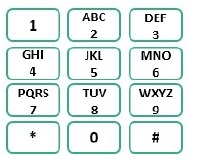
 Data Structure
Data Structure Networking
Networking RDBMS
RDBMS Operating System
Operating System Java
Java MS Excel
MS Excel iOS
iOS HTML
HTML CSS
CSS Android
Android Python
Python C Programming
C Programming C++
C++ C#
C# MongoDB
MongoDB MySQL
MySQL Javascript
Javascript PHP
PHP
- Selected Reading
- UPSC IAS Exams Notes
- Developer's Best Practices
- Questions and Answers
- Effective Resume Writing
- HR Interview Questions
- Computer Glossary
- Who is Who
Mobile Numeric Keypad Problem\\n
In this problem, a Numeric mobile keypad is given. We can only press top, bottom, right and left buttons of the current button, diagonal keys are not Allowed. We also cannot press the * and # buttons in the keypad.

A digit is given, we have to find the number of possible numbers of given digits can be formed, using the keypad, maintaining given rules.
Input and Output
Input: Digit count. Say 3 digit numbers. Output: Number of possible 3 digit numbers, that can be formed with the given conditions. Here the answer is 138.
Algorithm
getCount(n)
Input: number of digits n.
Output: Possible ways to type n digit numbers in a mobile keypad.
Begin if n <= 0, then return 0 if n = 1, then return 10 define two array row and col to move each direction from current key define count table of size (10 x n+1) for i in range 0 to 9, do count[i, 0] := 0 count[i, 1] := 1 done for k in range 2 to n, do for i in range 0 to 3, do for j in range 0 to 2, do if key[i, j] ≠ * or #, then num := key[i, j] count[num, k] := 0 for all possible moves, do rowMove := i + row[move] colMove := j + col[move] if rowMove in (0..3) colMove in (0..2), and key ≠ * or #, then nextNum := key[rowMove, colMove] count[num, k] := count[num, k] + count[nextNum, k+1] done done done done totalCount := 0 for i in range 1 to 9, do totalCount := totalCount + count[i, n] done return totalCount End
Example
#include <iostream>
using namespace std;
char keypad[4][3] = {
{'1','2','3'},
{'4','5','6'},
{'7','8','9'},
{'*','0','#'}
};
int getCount(int n) {
if(keypad == NULL || n <= 0)
return 0;
if(n == 1)
return 10; //1 digit number 0-9
int row[] = {0, 0, -1, 0, 1}; //for up and down the row will change
int col[] = {0, -1, 0, 1, 0}; //for left and right column will change
int count[10][n+1]; //store count for starting with i and length j
int move=0, rowMove=0, colMove=0, num = 0;
int nextNum=0, totalCount = 0;
for (int i=0; i<=9; i++) { //for length 0 and 1
count[i][0] = 0;
count[i][1] = 1
}
for (int k=2; k<=n; k++) { //for digits 2 to n
for (int i=0; i<4; i++ ) { //for Row wise
for (int j=0; j<3; j++) { // for column wise
if (keypad[i][j] != '*' && keypad[i][j] != '#') { //keys are not * and #
num = keypad[i][j] - '0'; //find the number from the character
count[num][k] = 0;
for (move=0; move<5; move++) {
rowMove = i + row[move]; //move using row moving matrix
colMove = j + col[move]; //move using column moving matrix
if (rowMove >= 0 && rowMove <= 3 && colMove >=0 && colMove <= 2 &&
keypad[rowMove][colMove] != '*' && keypad[rowMove][colMove] != '#') {
nextNum = keypad[rowMove][colMove] - '0'; //find next number
count[num][k] += count[nextNum][k-1];
}
}
}
}
}
}
totalCount = 0;
for (int i=0; i<=9; i++) //for the number starting with i
totalCount += count[i][n];
return totalCount;
}
int main() {
int n;
cout << "Number of digits: "; cin >> n;
cout << "Possible Combinations: " << getCount(n);
}
Output
Number of digits: 3 Possible Combinations: 138

Advertisements
